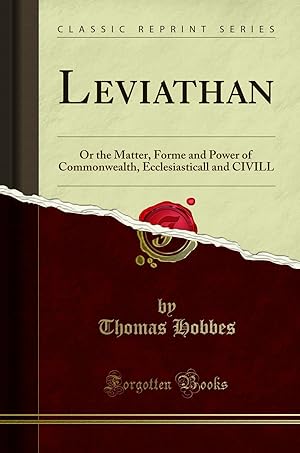Synopsis
Excerpt from Leviathan
Hobbes published his Leviathan at that age of sixty-three, mystically composed of seven tirr. As nine, which was said to form in a man's life the grand climacteric. He published it for instruction of the people at large in the philosophic rudiments of government, which, as he reasoned them, established as the best safeguard of national prosperity the absolute rule of a King. The political philosopher who followed him, and laid down principles of govern ment that served as interpretation of the spirit of the English Revolution, was John Locke, whose Two Treatises on Civil Government, are in another volume of this Library. Thomas Hobbes, son of a clergyman at Malmesbury, was from his earliest years an energetic student. He fastened so vigorously upon Greek and Latin, that as a school-boy he translated the whole Medea of Euripides into Latin verse.
Présentation de l'éditeur
Leviathan dated 1651 may roughly be divided into two classes, the original folio issue of that year and later, inferior reprints. These last, though also dated 1651, can be identified by the coarser and lighter impressions of the engraved title page, by the lines on the handle of the sword in the right hand of the Mortal God running diagonally instead of straight, by (in some copies) a misprint (C kooke for Crooke) in the imprint on the printed title page, and by many other small differences. Some of these differences were thus characterised by Whewell, in his lecture on Hobbes, Lectures on the History of Moral Philosophy in England, 1842, p. 21. In the common editions, the face has a manifest re semblance to Cromwell (the work was published in 1651), although it wears, as I have said, a regal crown :and in these, the engraving is well executed and finished. But in the copy belonging to Trinity College Library, the face appears to be intended for Charles the First. The en graving of this copy is very much worse than the other, and is not worked into the same careful detail by the artist, although the outline is the same :and the text of the book is a separate and worse impression, although the errata are the same with the other copies, as well as the date. How Hobbes himself, or any other person, should come to print the Leviathan in this manner, I am quite unable to explain.
(Typographical errors above are due to OCR software and don't occur in the book.)
About the Publisher
Forgotten Books is a publisher of historical writings, such as: Philosophy, Classics, Science, Religion, History, Folklore and Mythology.
Forgotten Books' Classic Reprint Series utilizes the latest technology to regenerate facsimiles of historically important writings. Careful attention has been made to accurately preserve the original format of each page whilst digitally enhancing the aged text.
Les informations fournies dans la section « A propos du livre » peuvent faire référence à une autre édition de ce titre.

